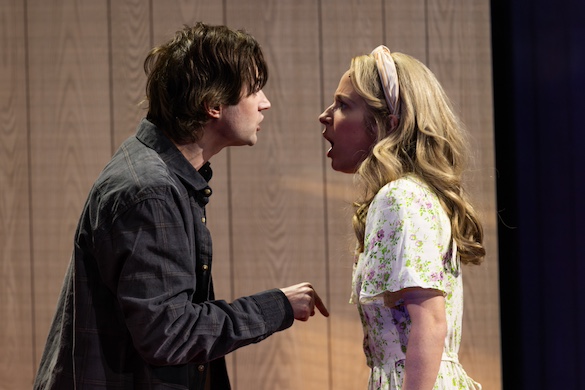If You Don’t See ‘Teeth’ on Broadway Anytime Soon, Blame the Especially Graphic Nature of Its Irreverence
Michael R. Jackson’s musical comedy follows his gleefully profane ‘A Strange Loop,’ a Pulitzer Prize winner, and the similarly raunchy ‘White Girl in Danger.’ If you can handle the subject matter, you’ll likely have some naughty fun here.

In the comedy-horror flick “Teeth,” released in 2007, a teenage girl who’s active in a Christian abstinence group discovers she has teeth in a rather unusual place; suffice it to say they could do considerable damage to any guy out to deflower her. The film was inspired by the legend of “vagina dentata” — Latin for “toothed vagina” — a fixture of various folk tales that purported to protect women’s honor while taking misogyny to a rather extreme level.
If this doesn’t seem like ripe terrain for musical comedy, you may be unfamiliar with the oeuvre of Michael R. Jackson, who made his Broadway debut a couple of years ago with the gleefully profane “A Strange Loop,” a Pulitzer Prize winner. That show, featuring a book, music, and lyrics by Mr. Jackson, traced a self-described “fat, Black, queer” artist’s journey to self-acceptance, leaving few taboos unshattered in the process.
Mr. Jackson followed “Loop” with the similarly raunchy “White Girl in Danger,” which managed to fold soap operas, serial killers, and police brutality into its giddy satire. That romp hasn’t made it to Broadway yet, and I would not expect Mr. Jackson’s adaptation of “Teeth” — crafted with Anna K. Jacobs, who co-wrote the libretto and composed the music — to transfer to Times Square any time soon.
That’s not a criticism of this new musical, but a reflection of the especially graphic nature of its irreverence, which I won’t describe in detail here — except to assure potential audience members that the blood and the body parts are both fake, as far as I know. If you’ve gotten past that sentence without starting to feel queasy, you’ll likely have some naughty fun here — though, predictably, that’s not all Mr. Jackson and Ms. Jacobs had in mind.
“Teeth” opens with a sort of religious pep rally, as a maniacal, creepy pastor — played, hilariously, by Broadway veteran Steven Pasquale, who will later turn up as a maniacal, creepy gynecologist — leads his flock of “Promise Keeper Girls” in denouncing one of their sisters in chastity, who has gone and gotten herself knocked up.

One by one, the young women lament their friend’s betrayal of the vow represented, as is sometimes the case in these circles, by a purity ring worn on her hand. Yet when the pastor asks Dawn, his favorite and our heroine — played by Alyse Alan Louis as a dutiful ingénue, at least initially — why her friend would soil herself, Dawn responds, practically chirping, “Because it felt good.”
Thus the seeds of rebellion are planted, gently at first; by the time “Teeth” has run its course, Dawn will have enlisted an army of pouting, seething revolutionaries to confront the evils of the patriarchy and, by extension, the hypocrisy of the pastor and others like him. (The ladies are dressed for success — that is, scantily — by costume designer Enver Chakartash, who gets to show off her range along with the actresses.)
Not surprisingly, all the male characters turn out to be jerks, from members of a cult called the Truthseekers — obviously modeled after “incels,” as digitally active purveyors of toxic masculinity have been labeled in recent years — to a young weasel named Ryan, who poses as Dawn’s protector mostly out of self-interest. The latter role, normally played by Jared Loftin, fell at a recent preview to understudy Sean Doherty, who sang robustly and proved expertly earnest and slimy, in turn.
Clearly, Ms. Jacobs and Mr. Jackson aren’t condemning the Y chromosome as much as “the marriage of ideology and violence,” as an authors’ note in the script puts it, that sustains the subjugation of women. And they’ve crafted an engaging, pop-savvy score that reinforces the show’s fundamental buoyancy right up to a literally fiery finale, in which the tone grows a little more somber.
“Sex, bodies, pain, shame, guilt,” the Promise Keeper Girls chant, the Truthseekers joining in as Dawn faces what seems like a final showdown. If “Teeth” reminds us how interwoven these subjects are in our world, the show delivers its bite with so much humor and panache that while the message may sting a little, it won’t hurt a bit.

